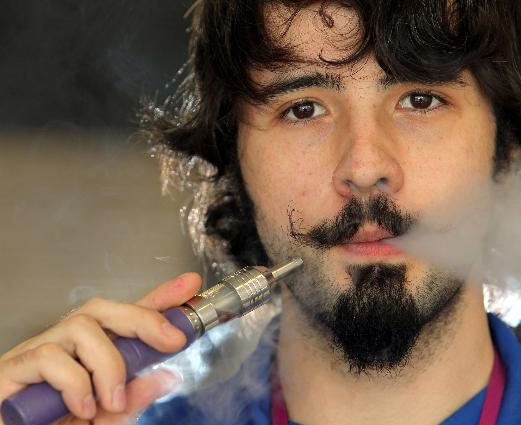Electronic cigarette peddlers are just blowing smoke, health officials say
By Nathan Porter – The Washington Times
That cloud hanging over electronic cigarettes these days isn’t just from the nicotine-laced vapor that the newfangled butts emit.
As big tobacco companies![]() rush to cash in on e-cigarettes and governments scramble to regulate their use, the nation’s top researchers say basic questions about the safety and long-term effects of e-cigarettes have yet to be answered. They also caution that regulators may be about to go too far without knowing what they are dealing with.
rush to cash in on e-cigarettes and governments scramble to regulate their use, the nation’s top researchers say basic questions about the safety and long-term effects of e-cigarettes have yet to be answered. They also caution that regulators may be about to go too far without knowing what they are dealing with.
At a gathering of the nation’s leading cancer specialists outside Washington this week, a panel on e-cigarette smoking, or “vaping” as it is often called, cast a skeptical eye on the intense regulatory interest in the e-cigarette phenomenon.
“One of the problems and challenges with the regulation will be how to not overregulate the product,” said Maciej Goniewicz, assistant professor of oncology at the Roswell Park Cancer Institute in Buffalo, N.Y. “We want the regulation to provide safer, better products, and this is a huge challenge.”
E-cigarettes are battery-powered electronic inhalers designed to resemble and function much like traditional tobacco cigarettes. Many electronic cigarettes release nicotine like tobacco cigarettes, but some release just flavored vapor. Because they do not use tobacco, e-cigarettes are viewed by many as less harmful than traditional cigarettes and a way for smokers to transition to a less-dangerous alternative.
The Food and Drug Administration has been forced to address the issue in large part because of the market excitement generated by e-cigarette sales.
Although still a fraction of the $90 billion U.S. tobacco market, annual e-cigarette sales have gone from $20 million five years ago to as much as $1.7 billion this year, according to analysts![]() . North Carolina-based Lorillard said its market-leading Blu e-cigarette brand recorded $63 million in sales in the most recent quarter, a fivefold increase aided in part by a national television ad campaign featuring model and actress Jenny McCarthy.
. North Carolina-based Lorillard said its market-leading Blu e-cigarette brand recorded $63 million in sales in the most recent quarter, a fivefold increase aided in part by a national television ad campaign featuring model and actress Jenny McCarthy.
The increasingly large sums involved also have sparked a lobbying battle. The Smoke Free Alternatives Trade Association — the “voice of the electronic cigarette industry![]() ” — plans a Capitol Hill “fly-in” next week to talk to lawmakers and staffers about the potential negative effects of state and federal regulatory initiatives.
” — plans a Capitol Hill “fly-in” next week to talk to lawmakers and staffers about the potential negative effects of state and federal regulatory initiatives.
“While our industry understands reasonable and appropriate regulation is needed, it is vital our young industry not be grouped with combustible cigarettes” as federal guidelines are drafted, said Cynthia Cabrera, executive director of the trade association. “Excessive regulation could limit adult access to e-cigs and stifle growth and innovation![]() in the segment.”
in the segment.”
Many industry watchers say e-cigarettes’ popularity may override concerns over their health effects.
“The challenge here is that big tobacco companies now have their own brands of electronic cigarettes. What drives this? Of course, the market,” Mr. Goniewicz said.
Some CEOs of e-cigarette companies have said that their goal is to make tobacco cigarettes obsolete. Government![]() regulation, they fear, could undercut the market before it can truly take off.
regulation, they fear, could undercut the market before it can truly take off.
Because of the lack of research, there is no way of knowing whether e-cigarettes help smokers quit or whether they merely cause smokers to switch, and only temporarily, to a less-harmful habit.
“The whole point here is that people who are addicted to tobacco are switching. This notion of switching from one thing to another is cognitively very different than quitting,” said Scott Leischow, a senior associate consultant at the Mayo Clinic’s Cancer Prevention and Control Program.
http://www.washingtontimes.com/news/2013/oct/31/electronic-cigarette-peddlers-are-just-blowing-smo/


